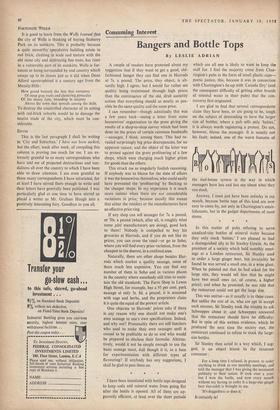Consuming Interest
Bangers and Bottle Tops
By LESLIE ADRIAN A couple of readers have protested about my suggestion that if they want to get a good, old- fashioned banger they can find one in Harrods at 7s. a pound. The price, they object, is ab- surdly high. I agree; but I would far rather see quality being maintained through high prices than the continuance of the old, drab austerity notion that everything should as nearly as pos- sible be the same quality and the same price.
I can remember—though admittedly this was a few years back—seeing a letter from some housewives' organisation to the press giving the results of a shop-to-shop survey which had been done on the prices of certain common foodstuffs —sausages, I think, among them. This had re- vealed surprisingly big price discrepancies, for no apparent reason; and the object of the letter was to protest against the gross profiteering of a few shops, which were charging much higher prices for goods than the others.
This struck me as singularly foolish reasoning. If anybody was to blame for the state of affairs it was the housewives themselves, who could easily have prevented the 'profiteering' by flocking to the cheaper shops. In my experience it is much more sinister when there are not considerable variations in price; because usually this means that either the retailers or the manufacturers have an effective pride ring.
If any shop can sell sausages for 7s. a pound, or 70s. a pound (which, after all, is roughly what some pâté manufacturers are doing), good luck to them! Nobody is compelled to buy his groceries at Harrods, and if you do not like its prices, you can cross the road—or go to Soho, where you will find every price variation, from the cheapest to the dearest, in a confined area.
• Naturally, there are other shops besides Har- rods which market a quality sausage, some of them much less expensive. You can find any number of them in Soho and in various places in the country where somebody still tries to main- tain the old standards. The Farm Shop in Lewes High Street, for example, has a 95 per cent, pork sausage at only 3s. 8d. a pound; it is seasoned with sage and herbs, and the proprietors claim it is quite the equal of the prewar article.
One objector to Harrods' prices asks if there is any reason why one should not make one's own sausage to one's own specifications. Indeed, and why not? Presumably there are still butchers who used to make their own sausages until it ceased to be profitable to do so and who would be prepared to disclose their formulx. Alterna- tively, would it not be simple enough to use the basic sausage meat, dull though it is, as a base for experimentation with different types of flavouring? If anybody has any suggestions, I shall be glad to pass them on.
I have been inundated with bottle tops designed to keep soda and mineral water from going flat after the bottle is opened. All of them are ap- parently efficient, at least over the short periods which are all one is likely to want to keep the stuff for. I find the majority come from Char- rington's pubs in the form of small plastic caps— poetic justice, this, because it was in connection with Charrington's tie-up with 'Canada Dry' (and the consequent difficulty of getting other brands a mineral water in their pubs) that the con- troversy first originated.
I am glad to find that several correspondents claim they have been, or are going to be, tough on the subject of demanding to have the larger size of bottles; where a pub sells only 'babies,' it is always worth registering a protest. Do not, however, blame the manager. It is usually not his fault; indeed, one of the worst features of the tied-house system is the way in which managers have less and less say about what they can stock.
Anyway, I must just have been unlucky in my search, because bottle tops of this kind are now easy to come by, not only in Charrington's estab- lishments, but in the gadget departments of most stores.
In this matter of pubs refusing to serve standard-size bottles of mineral water because they only stock 'babies,' I am pleased to find a distinguished ally in Sir Stanley Unwin. As the president of a society which held monthly meet- ings at a London restaurant, Sir Stanley used to order a large ginger beer, but invariably he found he was served a small one, in a wine glass. When he pointed out that he had asked for the large size, they would tell him that he might have two small ones (at, of course, a higher price); and when he protested, he was told that the restaurant could not get the large size.
This was untrue—as it usually is in these cases. But unlike the rest of us, who are apt to accept such excuses, Sir Stanley took the trouble to ask Schweppes about it; and Schweppes answered that the restaurant should have no difficulty. But in spite of this written evidence, which he produced the next time the society met, the restaurant continued to refuse to stock the large- size bottles.
Sir Stanley then acted in a way which, I sug- gest, is an object lesson to the timorous consumer : For a long time I refused, in protest, to order anything to drink at our monthly meetings, and told the manager that I was giving the maximum publicity to their action. It took over a year, but I won the battle, and now every month without my having to order it a large-size ginger beer (ice-cold) is brought to me.
'It's doggedness as does it.' It certainly is!


































 Previous page
Previous page